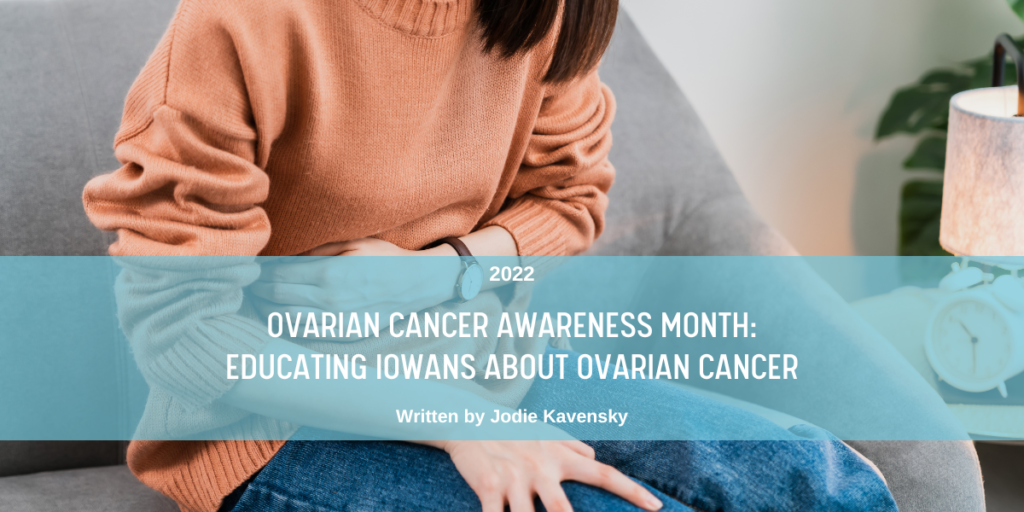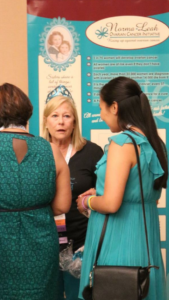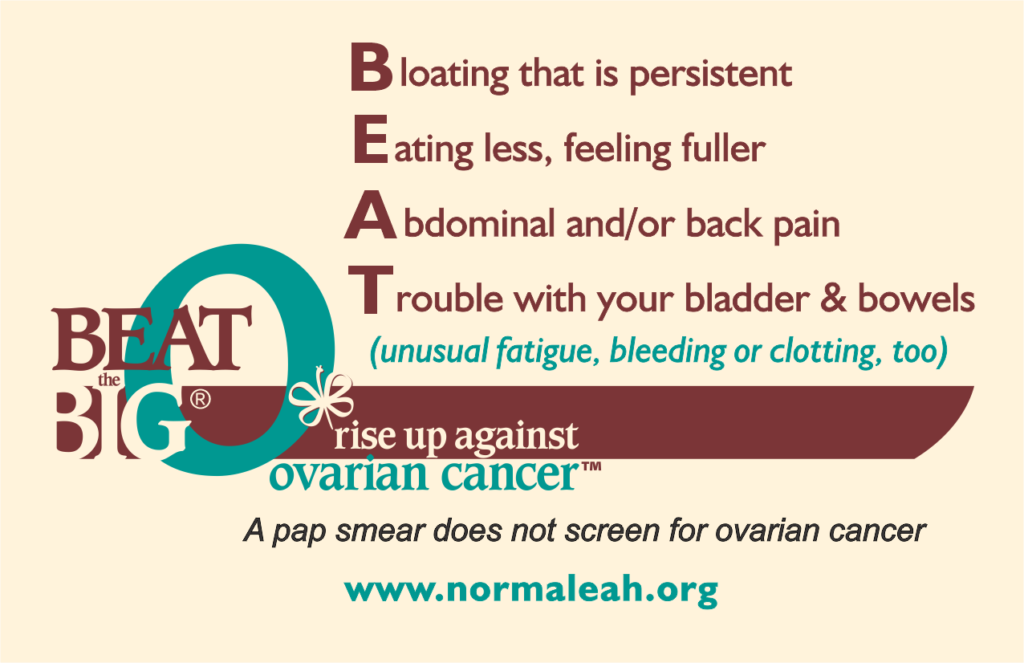Ovarian Cancer Awareness Month: Educating Iowans About Ovarian Cancer

By Jodie Kavensky
Founder/CEO of NormaLeah Ovarian Cancer Initiative
In Former President Barack Obama’s original National Ovarian Cancer Awareness Month proclamation in 2011, he stated, “it is crucial that women know how to recognize the warning signs” and he vowed to advance screening and treatment for the thousands of American women who are diagnosed with ovarian cancer annually. That same year, NormaLeah Ovarian Cancer Initiative, a 501(c)3 organization, introduced its first educational outreach program which focuses on symptomology. To date, more than 500,000 symptom cards have been distributed worldwide. Today, I’d like to share how we’ve been working with the state of Iowa to improve ovarian cancer outcomes in our own backyard.
Symptoms of Ovarian Cancer
Ovarian cancer is considered to be a rare disease with vague, fleeting symptoms that mimic other conditions. According to the CDC, these symptoms can include:
- Vaginal bleeding or discharge, especially post menopause
- Pain or pressure in the pelvic area
- Abdominal or back pain
- Bloating
- Feeling full too quickly, or difficulty eating
- A change in your bathroom habits, such as more frequent or urgent need to urinate and/or constipation
It also has a strong genetic connection to other cancers like colorectal cancer and breast cancer.
Diagnosing Ovarian Cancer
Ovarian cancer does not have an early detection test. Since it’s usually detected at Stage 3 or 4, it has metastasized and is difficult to treat. Fewer than 50% of those diagnosed will live beyond the five-year mark. However, if detected in Stage 1 or 2, survival rates would soar with more than 90% of patients living past five years[1]. Ovarian cancer is the deadliest of all gynecologic cancers and needlessly kills so many of those we love.

Sisters Norma Yecies Shagrin (May 21, 1935 – June 1, 2008) and Leah Yecies Hantman (July 27, 1931 – August 21, 1998), the namesakes of NormaLeah Ovarian Cancer Initiative.
NormaLeah’s Story
I lost my mother and her sister to ovarian cancer (in 2008 and 1998 respectively). Both were diagnosed at Stage 3C and saw gynecologic oncologists, which greatly improved their life expectancy (more on this below). Before my mother passed, she begged me to “be the voice for all those silenced by ovarian cancer” and I feel fortunate that I can honor her wishes. As founder of the NormaLeah Ovarian Cancer Initiative, I have seen first-hand the devastating effects this cancer has on families — over and over again.
The aim of NormaLeah’s programs is to reduce the incidence and mortality rates of ovarian cancer and make the patient’s journey easier. That’s accomplished through early detection education, survivor support services, and research funding. Our grassroots initiatives focus on education for both healthcare professionals and the general population. Because the programs are homegrown in the Quad Cities, Iowans are always the first to benefit.
Ovarian Cancer in Iowa
While ovarian cancer mortality rates in Iowa have decreased 35% between 1973 and 2017[2], research shows that survival rates would further improve if the disease could be detected earlier and treatment provided by a gynecologic oncologist. Unfortunately, rural ovarian cancer patients are 63% less likely to receive a referral to a specialist for surgery, are significantly less likely to receive surgery from a gynecologic oncologist, and must travel farther to receive this National Comprehensive Cancer Network (NCCN)-recommended care[3].
Effective screening methods for ovarian cancer do not exist, making knowledge the most powerful weapon against this disease. For the past two years, we have been working with Dr. Mary Charlton at the University of Iowa College of Public Health and the Iowa Cancer Registry, to overcome these obstacles. With federal funding, her research showed that many practitioners have a difficult time ruling out symptoms because they present like other maladies. These studies[3,4] also indicated that education for healthcare professionals is vitally important to achieve better outcomes for patients in Iowa.
Free Ovarian Cancer Education for Healthcare Providers
To that end, NormaLeah Ovarian Cancer Initiative has created a FREE one-credit CME/CEU program called “RULE OUT! Ovarian Cancer Early Detection and Risk Reduction” to help close the ovarian cancer knowledge gap within the medical community. The target audience includes general physicians, physician assistants, nurse practitioners, nurses, and other allied medical professionals.
This collaborative effort with the gynecologic oncology departments of University of Iowa and Rush University Medical Center, RULE OUT! is currently offered online to qualified professionals through the Rush University continuing education platform through December 31, 2022. We urge Iowa Cancer Consortium members and their colleagues to take advantage of this learning opportunity at https://bit.ly/22RULEOUT. It can make a major difference in a patient’s life.
Additional Resources
NormaLeah offers other programs that serve all people, all year round. More than 100 eastern Iowa and western Illinois ovarian cancer patients are helped each year through our sisterSTRONG program. I serve as health educator for Sisterly Advice, an empowerment session for groups ranging from 6 to 600 people. And our newest program, girlpARTs project, utilizes artfully created torso sculptures to highlight the genetic connection between ovarian and other cancers, especially breast.
As pandemic restrictions loosen, we are getting back into the community. You can find us at Riverssance (Davenport, September 17/18), PrideFest (Davenport, September 23/24), and Especially for You Walk/Run (Cedar Rapids, October 9). We will also be at the Iowa Cancer Summit on October 25. I invite you to stop by our table and see how our initiatives are positively impacting the lives of Iowa’s ovarian cancer patients and their families.
Closing Thoughts
I am grateful for the dedication of many scientists, physicians, patients, and tireless advocates (I count myself among the latter), who are changing the ovarian cancer landscape. Help us rise up against ovarian cancer and move the needle forward on this insidious disease by educating yourself and others about the symptoms of ovarian cancer.

Jodie at the Ovarian Cancer Research Alliance (OCRA) conference.
Sources:
- https://ocrahope.org/patients/about-ovarian-cancer/staging/
- https://shri.public-health.uiowa.edu/2020/03/27/state-health-registry-of-iowa-issues-cancer-in-iowa-2020-report-highlights-ovarian-cancer
- https://www.ncbi.nlm.nih.gov/pmc/articles/PMC7869694/
- https://www.liebertpub.com/doi/full/10.1089/whr.2020.0090

